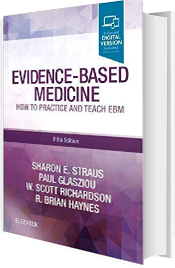There is a growing body of evidence relating to the impact of EBM on healthcare professionals, from systematic reviews of training in the skills of EBM,1 to qualitative research describing the experience of EBM practitioners.2 There have been many studies evaluating EBM educational interventions, however, these studies of the effect of teaching and practicing EBM are challenging to conduct. This is due to the fact that, in many studies, the intervention has been difficult to define. In addition, the evaluation of whether the intervention has met its goals has been a challenge, since effective EBM interventions will produce a wide range of outcomes. Adding to the challenge is the detection of changes in clinical outcomes. We encourage teachers and researchers to consider that it is necessary to consider changes in performances and outcomes over time, because EBM requires lifelong learning and this is not something that can be measured over the short term.
- Parkes J, Hyde C, Deeks J, et al. Teaching critical appraisal skills in health care settings. Cochrane Database of Syst Rev. 2001;(3):CD001270. ↩
- Greenhalgh T, Douglas HR. Experiences of general practitioners and practice nurses of training courses in evidence-based health care: a qualitative study. Br J Gen Pract. 1999;49:536-540. ↩

